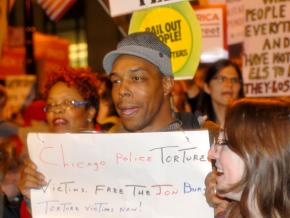Chicago torture commission shut down
reports on how an effort to gain justice for torture victims is being gutted.
THREE YEARS ago, a South Side Chicago attorney was able to convince Illinois state legislators of the need for a commission to investigate allegations of torture at the hands of former Chicago Police Commander Jon Burge.
Earlier this month, the Torture Inquiry and Relief Commission issued its first recommendations for new hearings in the cases of men still behind bars because of confessions tortured out of them by Burge and his men. But the commission may never meet again--because the Illinois state legislature has cut all funding for its investigations and operations.
No one doubts any more that torture did take place in Chicago police stations against African American and Latino suspects. In June 2010, Burge was found guilty of perjury and obstruction of justice related to the torture cases--he was never charged with the act of torture itself because the statute of limitations had run out. Burge is in prison today, having been sentenced to four-and-a-half years by a federal judge.
But as many as 23 Burge torture victims are also behind bars in Illinois. For many, there is no evidence that they are guilty of the crime they were convicted of, besides the confessions that Burge and his subordinates beat and tortured the men into signing or speaking. But they have not been allowed even new hearings into their cases, even now that the acts of torture against them are acknowledged.

This is what the commission was supposed to do: Investigate claims of torture and recommend action to the Cook County chief judge. In June, the panel said it found "credible" evidence of torture in five of the nine cases it looked into. But at its press conference, the commission said it wouldn't set a date for another meeting because the state legislature had zeroed out the funding.
Last year, the budget for the commission, whose members are volunteers and receive no compensation, was $150,000. This year's budget request was $235,000, to allow the commission to hire a staff attorney. "I think they can look on the floor and find it in pennies, it's such a small amount," said Cheryl Starks, the chair of the torture commission. "Honestly, I think they don't want to."
Jeanette Plummer's son Johnny--who says he was tortured by Chicago police at age 15 into confessing to two murders he didn't commit--is one of the current prisoners who won't get any action on his case because the commission shut down operations. "They're going to let someone rot in jail because they're trying to save money?" Jeanette Plummer said. "That's not fair. I'm a taxpayer, too,"
MARK CLEMENTS--who was also a teen when he was tortured into a confession by Burge's men, and spent 28 years unjustly incarcerated before he was finally released--has continued to fight for other Burge victims since winning his freedom. He wants to know how legislators can cut off funding for investigations:
Why would these men be denied hearings on their claim of torture by a government that proclaims throughout the world that it is a humane nation. Men such as Robert Allen, Harvey Allen, Javan Deloney, Grayland Johnson and many others sit confined inside a closet, which is called a prison cell, while Illinois state Legislators have said that their claims aren't worth investigating for $150,000.
When elected officials are questioned about torture, they all appear to not accept this practice, but many seem to make a choice to be silent. Elected officials aren't in office to serve themselves--they're elected to their posts to serve the people.
The only reason we ever got any justice in the first place around the Burge issue was because there was a lot of public pressure. We are going to have to continue to fight every inch of the way to win justice for these men. Defunding the commission is a slap in the face to all these family members and prisoners who have suffered endlessly for years without anyone reviewing their cases. I will not rest until we win justice.
July 19 will mark the sixth year since the release of the Cook County special prosecutor's report on tortures by Burge and his subordinates. Clements and other activists are calling for a solidarity march at 5 p.m. that day, from the former Area Three violent crime unit at 3900 S. California to the Cook County courthouse at 2600 S. California. We have to keep up the fight to win justice for all torture victims in Chicago.


